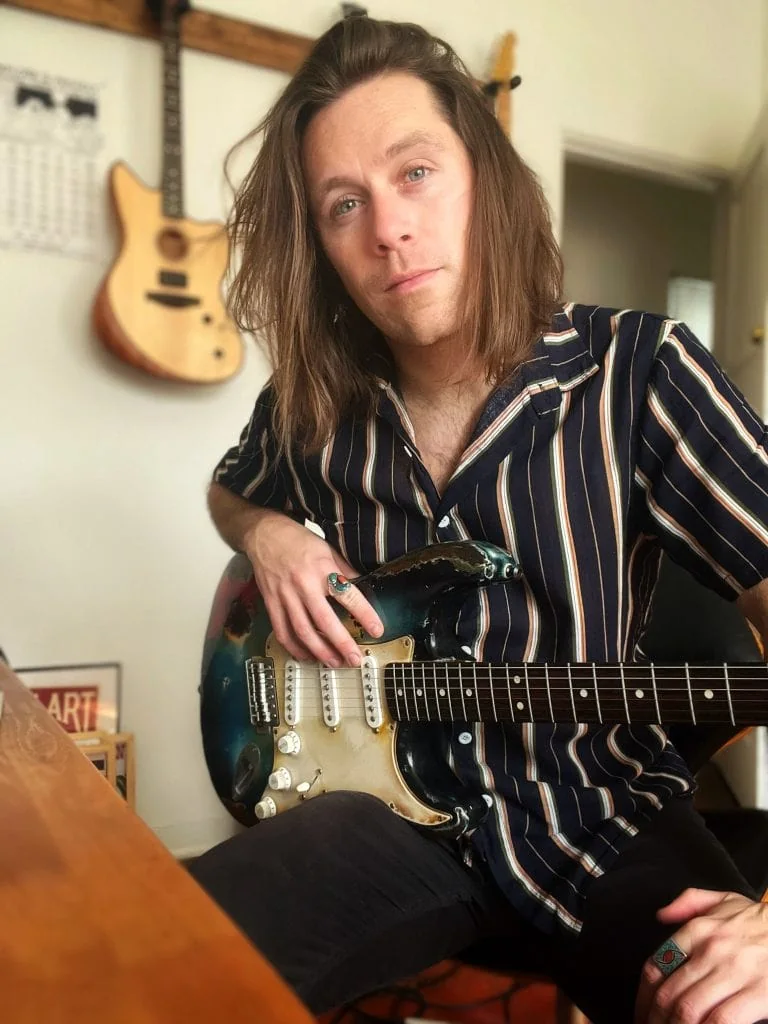
Author: Tyler Connaghan
Tyler Connaghan is a guitarist, singer, producer, composer & engineer based in Los Angeles, California. Tyler has been playing the guitar since 2007. In between writing for guitar publications, he produces music for film and television. His favorite axe is his custom Pelham Blue Fender Stratocaster.
Expertise: music industry, producing, acoustic & electric guitars, songwriting
Bachelor of Science in Music Industry Studies, Music Industry

Editing & Research: Teemu Suomala
I first grabbed the guitar in 2009. I started this website in January 2020 because I couldn’t do window installation anymore due to my health problems. I love guitars and have played dozens and dozens of different guitars through different amps and pedals over the years, and also, building a website interested me, so I decided to just go for it! I got lucky and managed to get awesome people to help me with my website.
I also got lucky because I have you visiting my website right now. Thank you. I do all this for you guys. If you have any recommendations, tips, or feedback, just leave a comment, I would love to chat with you. I have also been fortunate to produce content for several large guitar websites, such as Songsterr, Musicnotes, GuitarGuitar, and Ultimate Guitar.
I spend my spare time exercising and hanging out with my wife and crazy dog (I guess that went the right way…).
While rock, blues, folk, and metal dominate the guitar spotlight, jazz guitarists have long demonstrated just how versatile the instrument can be.
In this guide, I want to take you on a journey through the lives and times of 10 of the most renowned jazz guitar players in history. From Dixieland jazz to smooth jazz and modern jazz to modal jazz, we’ll delve into their stories and how they contributed to the world of jazz.
Our other Top 10 guitarist lists:
–10 Best Guitarists of All Time
–10 Best Blues Guitarists of All Time
Note! Reveal your top 10 list in the comments down below, we would love to hear it!
How Did We Choose The Best Jazz Guitarists
Here are five different ranking factors I used to qualify the best jazz guitarists.
- Technical Prowess: First, I looked at their mastery of the instrument, from speed to accuracy to versatility and beyond.
- Innovation/Creativity: Next, I looked at whether or not they pushed boundaries, introduced new ideas, or contributed to the evolution of jazz guitar.
- Legacy: I also considered their impact on other musicians and how their lasting legacy shaped the course of jazz history.
- Improvisational Skills: Next, I analyzed their ability to improvise both creatively and melodically, as I see this as a crucial aspect of jazz guitar playing.
- Musicality: Lastly, I looked at their emotional connection to the music and the encompassing musicality, such as phrasing, dynamics, or whether or not they could convey deep emotions through their playing.
10 Best Jazz Guitar Players of All Time
1. Wes Montgomery

Guitar of Choice: Gibson L-5 CES
Wes Montgomery was a profoundly influential jazz guitarist hailing from Indianapolis. Despite his inability to read music, his virtuosity on the fretboard was unparalleled, from every riff and rhythm. He used a unique thumb-picking technique inspired by the horn-like phrasing of his bebop idol, Charlie Christian, though took it a step further with an advanced harmonic style using block chords and parallel octaves.
His groundbreaking album “Incredible Jazz Guitar of Wes Montgomery” became a cornerstone of his legacy, showcasing his creative prowess. His untimely death was a great loss to the music world, but his influential contributions continue to resonate through generations of jazz guitarists who have been inspired by his trailblazing approach.
Check Montgomery playing here:
Strengths
- Brilliant improvisation capabilities
- Unique thumbing technique
- Soulful phrasing
Weaknesses
- Limited use of complex chord voicings
Imagine Having The Technique, Gear, and Sound of The GOATS… But Don’t just imagine. Find out.
Joe Satriani
Main Band
Solo Artist
Main Guitar
Ibanez Joe Satriani Signature JS2480
Joe Satriani
| Uniqueness | (4.5) |
| Accuracy | (5.0) |
| Speed | (5.0) |
| Right Hand | (5.0) |
| Techniques | (5.0) |
| Versatility | (3.5) |
| Performance | (4.5) |
| Overall Lead | (5.0) |
| Overall Rhythm | (4.5) |
Tommy Emmanuel
Main Band
Solo Artist
Main Guitar
Maton TE Personal
Tommy Emmanuel
| Uniqueness | (3.5) |
| Accuracy | (4.5) |
| Speed | (5.0) |
| Right Hand | (5.0) |
| Techniques | (5.0) |
| Versatility | (4.0) |
| Performance | (4.0) |
| Overall Lead | (5.0) |
| Overall Rhythm | (5.0) |
Steve Vai
Main Band
Solo Artist
Main Guitar
Ibanez Steve Vai JEM77
Steve Vai
| Uniqueness | (4.5) |
| Accuracy | (5.0) |
| Speed | (5.0) |
| Right Hand | (4.5) |
| Techniques | (5.0) |
| Versatility | (3.0) |
| Performance | (4.5) |
| Overall Lead | (5.0) |
| Overall Rhythm | (4.5) |
2. Django Reinhardt

Guitar of Choice: Selmer Maccaferri
A pioneer of 1930s European hot jazz, Django Reinhardt was a true prodigy. Despite having only the use of his thumb and two middle fingers on his left hand due to a fire-related injury, he defied all odds to achieve an astonishing level of speed, precision, and manual dexterity with his soling and licks.
His playing technique was both imaginative and emotional, and you can feel it in his music. Regarded as a true jazz legend, his legacy continues to amaze and inspire.
Check Reinhardt playing here:
Strengths
- Exceptional speed and dexterity
- Influential gypsy jazz style
Weaknesses
- Limited complex chord ability due to hand injury
3. Charlie Christian

Guitar of Choice: Gibson ES-150
Hailing from Texas, Charlie Christian was a genuine revolutionary in the world of jazz guitar. His meteoric rise to fame came during his tenure with Benny Goodman’s band from 1939 to 1941. Christian’s groundbreaking contribution was pioneering the use of the electric guitar in jazz, a move that shifted its role from the rhythm section to the forefront as a valid solo instrument.
He infused his playing with horn-inspired single-note lines, ushering in a new era for the instrument and laying the foundation for what later evolved into bebop. Tragically, at the young age of 25, he succumbed to tuberculosis, leaving behind a lasting legacy.
Listen Christian’s playing here:
Strengths
- Unique bebop phrasing
- Pioneered the use of amps
- Brought guitar to the forefront of jazz
Weaknesses
- Limited recordings available
4. Jim Hall
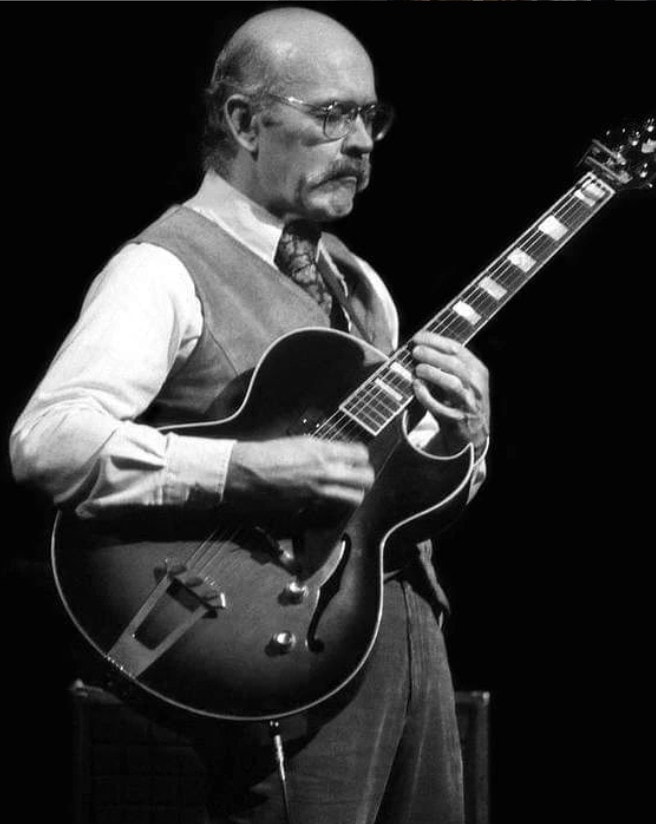
Guitar of Choice: Gibson ES-175
Jim Hall was born in 1930 in Buffalo, New York, and gained recognition in the 1950s as part of the Jimmy Giuffre Three. Later on, he collaborated with legendary musicians like Bill Evans and Paul Desmond and truly skyrocketed to jazz fame.
Hall’s signature warm and mellow sound sets him apart from the rest. He is a true master of using space and tonal contrast in his playing. Pair that with his ability to weave intricate musical stories, and it’s clear to see what made him a paragon of taste and sophistication.
Check Hall playing here:
Strengths
- One of the best accompanists
- Top improvisational skills
- Subtle playing style
Weaknesses
- Not very technically virtuous
5. Grant Green

Guitar of Choice: Gibson L-100
Grant Green’s soulful St. Louis blues style emerged in the 1960s, becoming synonymous with the hard-bop and soul-jazz movements. Born in 1935, Green’s prolific career included iconic albums like “Idle Moments” and “Street of Dreams.”
His musical style was influenced by bebop brass players, which is why he adopted such a linear style, favoring single-line melodies over chords. Even with a less-is-more aesthetic, he often performed in an organ trio setting.
With an uncanny ability to convey emotion through each note, Green cemented his legacy as one of jazz’s greats.
Check Green playing here:
Strengths
- Bluesy style
- One-of-a-kind groove
- Soulful improvisation
Weaknesses
- Limited harmonic exploration
6. George Benson

Guitar of Choice: Ibanez GB10
George Benson’s smooth and soulful jazz-pop style brought him critical acclaim and made him one of the few guitarists on this list who achieved widespread commercial success. His career flourished with albums like “Breezin'” and “Give Me the Night.”
Inspired by the likes of Charlie Christian and mentored by the legendary Wes Montgomery, many people call him Montgomery’s rightful successor. From a young age, he displayed prodigious talent, and as he grew older, he transformed into a jazz and soul sensation. By the 1970s, he was even beginning to embrace his vocals, especially in the scatting realm.
With his exceptional vocal ability and virtuosic guitar skills, it’s clear that he’s solidified his status as a true jazz icon.
Check Benson playing here:
Strengths
- Versatile performer
- Vocal-like phrasing
- Appealed to a broader pop audience
Weaknesses
- Was criticized for shifting toward pop
7. Kenny Burrell
Guitar of Choice: Gibson Super 400
With a career spanning over seven decades, Kenny Burrell’s velvety guitar tone and tasteful phrasing have captivated audiences worldwide. Born in 1931 in Detroit, Burrell’s journey with the guitar began at the tender age of 12. By 20, he made his recording debut alongside the eminent trumpeter Dizzy Gillespie.
His musical influences draw from a diverse palette, including blues music, though he also was said to have found inspiration in legendary guitarists like Django Reinhardt and Charlie Christian. He would eventually go on to collaborate with artists like John Coltrane and Jimmy Smith resulted in timeless jazz classics like “Midnight Blue” and “Blue Lights.”
In terms of his technique and sound, Burrell effortlessly transitions between soulful and hard-swinging playing styles. It’s truly hard to overstate his influence on jazz guitar.
Check Burrell playing here:
Strengths
- Exceptional blues style
- Angelic tone
- Sensitive playing
Weaknesses
- Was often overshadowed by flashier players
8. Joe Pass

Guitar of Choice: Joe Pass Emperor II
Next on our list, we have the great Joe Pass, known for his unrivaled solo guitar performance skills. He was born in New Jersey in 1929 and began his guitar journey at the tender age of nine. Progressing rapidly, he found himself performing gigs by the time he reached 14. His exceptional versatility as a guitarist was apparent, and he carved out a distinctive and innovative style, allowing him to articulate melodious lines through deft sequences of chord progressions.
After overcoming many personal struggles, he achieved fame in the 1970s with his innovative approach to chord melody playing. Though he used Fender guitars for a brief stint, he was most well-known for his signature models.
One big chunk of Pass’s musical included the many years spent accompanying Ella Fitzgerald, as well as the extensive musical partnership with the esteemed pianist Oscar Peterson.
Joe Pass’s contributions to the jazz world have been nothing short of remarkable, and his “Virtuoso” series of albums remains a benchmark for solo jazz guitarists.
Check Pass playing here:
Strengths
- Untouched solo guitar skills
- Sophisticated music theory knowledge
- Simultaneous bassline playing
Weaknesses
- Did not play much with ensembles
9. Pat Metheney
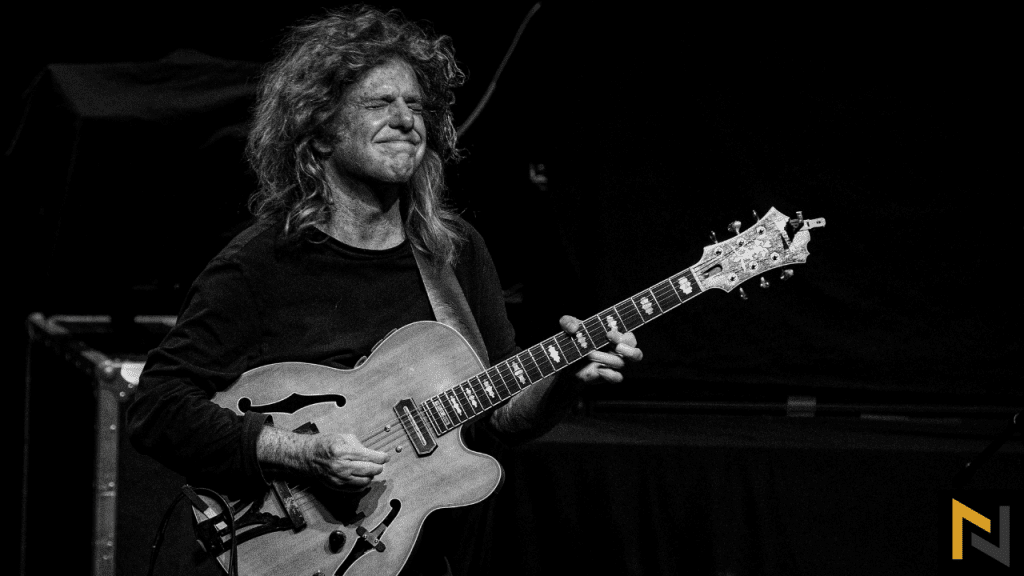
Guitar of Choice: Ibanez PM200
Pat Metheney is a true pioneer of contemporary jazz. He was born in 1954 in Missouri and has crafted multiple Grammy-winning albums. Beyond his solo work, he has collaborated with luminaries like Jaco Pastorius and Herbie Hancock, fusing various genres and using modern technology to push the boundaries of jazz guitar.
Metheney also had several album credits in the pop world, ranging from collaborations with Joni Mitchell to David Bowie. It’s hard to boil his artistry down, though many describe it as a blend of lyricism and harmonic richness.
To this day, his genre-defying music resists easy classification, and yet, it has earned him a remarkable 20 Grammy awards. Regarded as one of the best jazz guitarists in history, Metheny also holds the distinction of being the most progressive guitarist in the contemporary jazz landscape.
Check Metheney playing here:
Strengths
- Adventurous playing style
- Impressive technical skills
- Blended multiple genres
Weaknesses
- Some say his avant-garde style was too experimental
10. Barney Kessell

Guitar of Choice: Gibson ES-350
Barney Kessell’s impeccable technique and melodic inventiveness earned him the last spot on our list. Born in 1923 in Tuskegee, Oklahoma, Kessell’s work as a studio musician in the 1950s and ’60s solidified his place in jazz history.
He eventually became a famed member of the 60s LA session group, The Wrecking Crew, showcasing his remarkable talent alongside some of the industry’s finest musicians. Notably, he made a memorable contribution to Julie London’s 1955 album, “Julie Is Her Name,” featuring the timeless track, “Cry Me A River.”
As one of the best jazz guitarists at the time, he had the privilege of performing alongside the jazz elite, such as Sonny Rollins and Billie Holiday, both of whom hailed him for his fluid sound and thoughtful chord selection.
I highly recommend listening to his album “To Swing or Not to Swing,” as I believe it best exemplifies his exceptional musicality.
Check Kessel playing here:
Strengths
- Exceptional session musician
- Smooth, melodic style
- Prominent in the west coast jazz scene
Weaknesses
- Did not have a well-known solo career
Runner-Ups That Just Missed The List
Emily Remler
Guitar of Choice: Gibson ES-175
The jazz community mourned the loss of a gifted guitarist born in Manhattan, whose talent was tragically cut short by a heart attack. Her musical journey began at the tender age of 10, and throughout her career, she acknowledged the influence of jazz greats Joe Pass and Wes Montgomery.
However, it was her own dedication to honing a distinctive style that elevated her to the ranks of the best jazz guitarists in history.
Emily Remler’s playing style is best described as a captivating blend of languid grace and emotional intelligence. She had a unique ability to express deep emotions through her guitar, and she possessed a virtuosic command of the fretboard. Unfortunately, even throughout her time, she never achieved the same mainstream recognition as the other guitarist on the list.
Pat Martino
Guitar of Choice: Gibson Pat Martino Signature Model
Born in Philadelphia in 1944, Pat Martino, born Pat Azarra, began playing the guitar at the age of 12 and quickly gained recognition for his remarkable talent. He was given the title of a “musical shape-shifter,” with untouched dexterity and finesse. Throughout his career, he was able to effortlessly transition from straight-ahead jazz to fusion and post-bop styles, showcasing his versatility.
His early years were marked by valuable apprenticeships with esteemed soul-jazz musicians like Richard “Groove” Holmes and Willis Jackson. These experiences laid a strong foundation for his career, which took flight with his solo career in the latter half of the 1960s.
Martino’s passion for music and desire to share his knowledge eventually led him to write textbooks on various guitar-playing approaches. As an unparalleled guitar virtuoso with an insatiable curiosity for musical exploration, Pat Martino’s contributions to the jazz world have been immense, leaving an indelible mark on the genre and inspiring aspiring guitarists worldwide. Still, many critics say he lacks the emotional depth in his playing compared to other jazz greats, which is why he only made the runner-up list.
Johnny Smith
Guitar of Choice: Gibson Johnny Smith Model
Johnny Smith, born in Birmingham, Alabama, in 1922, was an early pioneer of the jazz guitar. His smooth and lyrical style earned him the nickname “The Sound.”
As a pre-teen, he found himself drawn to local pawnshops where he taught himself to play the guitar. His innate versatility became evident when he joined a hillbilly band on tour before eventually gravitating towards jazz. In fact, his early jazz career saw collaborations with iconic musicians like Stan Getz and Benny Goodman.
With a remarkable ability to effortlessly switch between various styles, including swing, bebop, and even avant-garde classical music, he quickly became a sought-after musician.
Aside from his impressive guitar skills, Smith was also a gifted composer. His timeless composition, “Walk, Don’t Run,” written in 1954, became an instrumental standard and achieved success as a hit for Chet Atkins.
Johnny Smith’s musical prowess and innovative compositions have left an enduring impact on the music industry. However, his limited experimentation within the various jazz styles keeps him off the main list.
Charlie Hunter
Guitar of Choice: Custom 7-String Guitar
Born in 1967 in Rhode Island, Charlie Hunter took a revolutionary approach to jazz guitar. He adapted his instrument, adding extra strings and combining bass and guitar elements into one performance, demonstrating incredible multitasking abilities.
Early on, he preferred his custom-built seven- and eight-string guitars, and by the early 1990s, he took his unique skills and gained recognition as a member of Michael Franti’s The Disposable Heroes Of Hiphoprisy before venturing into a successful solo career.
During his five-year stint at Blue Note, Hunter blended his jazz roots with a captivating fusion of pop, rock, and funk, resulting in an unparalleled and unclassifiable sound that set him apart as a truly unique voice.
Though his genre-defying style earned him a devoted fan base and solidified his place as a visionary musician in the realm of jazz, he never quite achieved the same level of mainstream success as his contemporaries.
Gabor Szabo
Guitar of Choice: Gibson SG
Gabor Szabo, born in Hungary in 1936, was a prominent jazz guitarist and composer. His distinct style melded jazz with elements of Hungarian folk music and psychedelic rock, creating a truly innovative sound that resonated with audiences worldwide.
He was well known for his extended modal vamps, psychedelic tones, and Indian ragas. Even the legendary Mexican guitarist Carlos Santana talks about how much he was impacted by Szabo.
By the early 1960s, he gained prominence as a member of Chico Hamilton’s jazz group, though soon after, he ventured into a successful solo career.
With an unmistakable artistic vision, this Budapest-born guitarist’s contributions have left an enduring impact on the world of music. And even though he inspired countless musicians to embrace experimentation, the fact that he lies just outside the standard jazz realm is the only reason I decided not to put him on the top 10 list.
FAQ
Who Is Chosen to Be The Best Jazz Guitarist Most Often?
With so many exceptional jazz guitarists, the title of the best jazz guitarist is pretty subjective. Ask any expert or enthusiast, and you’ll get a different answer. However, iconic figures like Django Reinhardt, Wes Montgomery, and Joe Pass are often cited as the bests.
Who is Considered to Be The Best Female Jazz Guitarist of All Time?
Emily Remler is widely regarded as one of the best female jazz guitarists of all time. Her unique style, technical proficiency, and significant contributions to jazz earned her a high level of admiration among musicians and fans.
Who is The Most Famous Jazz Guitarist?
Though there are many famous jazz guitarists, Wes Montgomery is undoubtedly one of the most famous and influential. Throughout his career, he gained recognition for his distinctive thumb-picking technique and soulful sound.
Why Do Jazz Guitarists Often Use Hollowbody Guitars?
Jazz guitarists often use hollowbody and semi-hollowbody guitars for their warm, rich tones. Plus, the hollow design provides acoustic resonance, perfect for playing without strong amplification.
Who is The Father of Jazz Guitar?
Many refer to Charlie Christian as the “Father of Jazz Guitar.” He pioneered the use of the guitar in jazz in the 1930s and 1940s.
Which Jazz Guitarist Had 3 Fingers?
Django Reinhardt had only two functional fingers on his left hand due to a fire accident. Even so, he developed a unique playing technique and defied the odds, becoming one of the most influential guitarists in jazz history.
Conclusion
Though I could easily list many more, these 15 jazz guitarists left an indelible mark on the world of jazz, each contributing unique styles and techniques to the genre’s evolution. From New Orleans, Louisiana, to Los Angeles, California, jazz is one of the most prominent American genres there is, and most of it wouldn’t be what it is today without these players.
Though many of them have passed, their musical legacies continue to inspire countless aspiring jazz musicians.
If you have any questions or thoughts, just leave a comment down below. Keep rocking!



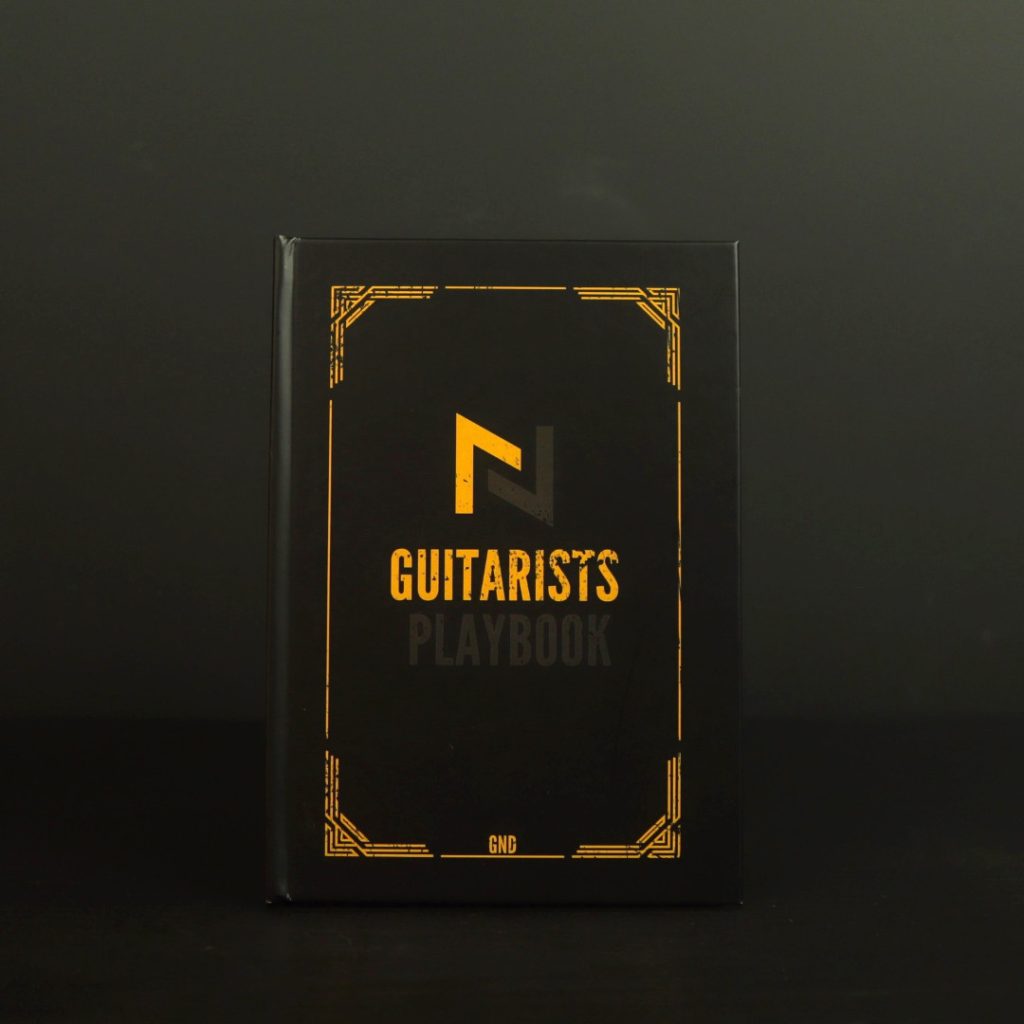
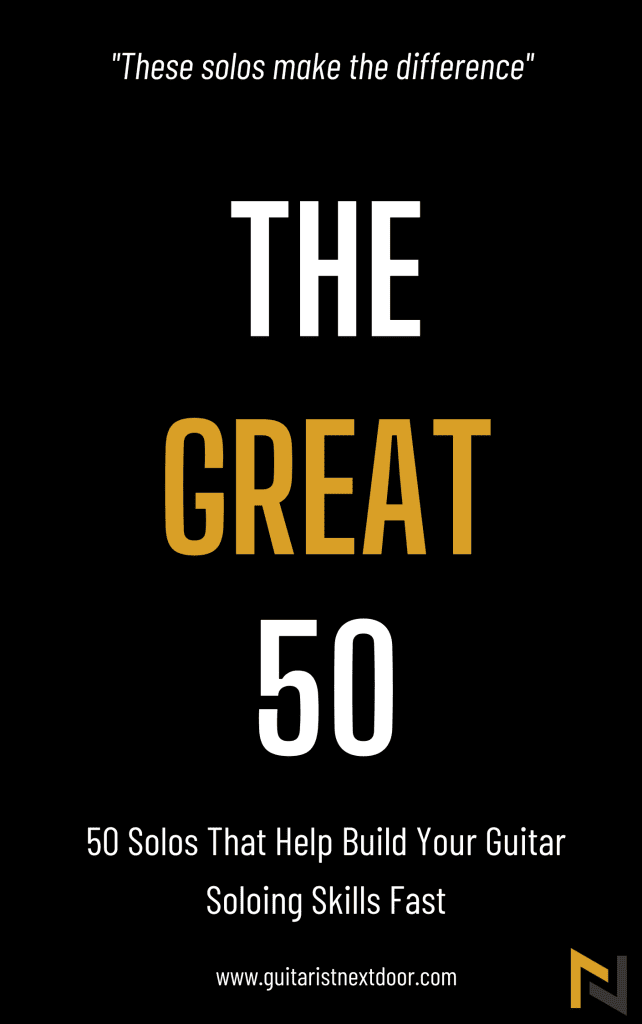












No Larry Carlton? Are you kidding?
Where is John Mclaughlin in the best of the best lists of jazz guitarist???
Good article.
I miss my friend, Howard Roberts in your list, but it’s ok as you said, you can’t get them all.
I spent some good times, a lot of laughs with Barney Kessel.
I fixed his life-long problem with his beloved Charlie Christian pickup equipped L7 Gibson-hum. He had been to everyone, everywhere to try to find a way to eliminate the hum WI5HOUT impeding the sound in any.way at all.
He had quotes around $3,000,with whole systems inside the sacred guitar.
He came into my shop and anxiously layed out his problem
I plugged him in and we both got hum “ok” i.said “go to the elegant cloffee shop and rest about 20 minutes” Barney said “quote?” “Oh – just about the same as the espresso.at that joint ” he.came back in 10 mlintes munching on a donut.
I was just tuning it up “all done, let’s plug her in” we.did, no hum! , no change in sound, nothing to see, no batteries
“Wow man, I’ve trying.to get the.hum out of this guitar for.about 40 yejars, how much”
“15 bucks” I said – we were fast friends, hanging.around, playing guitars, joking. He evken ripped off one of my jokes at the Paul Mason.lunchon.
it was.totally over the top Playing.with one of the world’s best guitarists.
Dan Torres
Hi Dan! Amazing to hear your story with Howard Roberts! Great that you were able to meet, help, and befriend him. Take care Dan and again, thanks for sharing something really interesting with us! 🙂
Hi Dee and thanks for commenting! John Mclaughlin just missed the list.
Hi Grandpa! No, we kiddos are not kidding, haha. Carlton just missed the list. Take care!
No Hank Garland????
Played too much pop& Rock
Joe Pass #8, ridiculous
Hi Rich! #8 is a great spot IMO. Take care!
I agree! He should of bin in top 3!
John McLaughlin is the best.
I agree Michael
Thanks
Dee F
I believe that you should listen to TUCK ANDRESS an Amazing Guitarist????
Hi Clifford! I agree, we should listen to him. Take care!
Hi Michael! Thank you for pointing John McLaughlin out!
The bottom 4 of the list should be among the top 6, with Benson and Montgomery joining them, in no particular order. And no Larry Carlton? Pat Martino is just an honorable mention?
Hey, that’s just my opinion… Whatever, right ?
Music, especially jazz (in my opinion) is an art form , not a competition, and any attempt to “rank” players simply results in just another list of someone else’s favorites.
If u don’t know Al DiMeola, u don’t know anything about guitar players ! This man blows away any & all comers ! WAKE UP !!!!!!!!!!
Not that I don’t appreciate all the others, but
this man can play any & all genres of music !
Guinness World record holder for speed & accuracy . Again, WAKE UP !!!
Hi David and thanks for revealing your opinion! I agree Al DiMeola is a great player.
Hi Ray! Thank you for sharing your opinion with us! Take care!
I definitely agree with Mr Conklin.Also an Honorable Mention should include Ed Bickert. Hall himself felt Bickert was amazing as many others like Paul Desmond also did. Schofield has also proven himself to be an extremely versatile artist within the Jazz World. As far as McLaughlin is concerned he has proven to be an extremely versatile artist
However he hasn’t always been Leading torch within the Jazz Community….
Sorry Jeff..
Hi Tony! Thanks for revealing your thoughts. McLaughlin can make a guitar (and PRS guitar) truly sing…Take care!
I believe that you should listen to TUCK ANDRESS an Amazing Guitarist????
Hi Clifford! Thanks for pointing Tuck Andress out! I agree, we should listen to him. Take care!
Thanks for taking time to share your thoughts and opinions. All good choices – at least in my opinion. Just so you know, my personal favorite is Kenny Burrell, and do my humble best to emulate his style. Play well!
Thank you so much for your nice comment and sharing your thoughts. Kenny Burrell’s All Star Guitar Night performance from 2015 is a great piece! Take care!
Two Oklahomans in the top 10. Pat Metheny is a personal favorite. Curious to know where Stanley Jordan and Lee Ritenour would be placed in an expanded list.
Hi Jim! Yes, Oklahoma is well represented! Stanley Jordan and Lee Ritenour would most likely be in the top 20. Take care!
I’d like to see a top ten Fusion list.
Hi Douglas! Thank you so much for giving us a great topic to write about. Take care!
Where does Tal Farlow fit in this list?
Hi Pete! Farlow just missed the list.
No mention of Louis Stewart. Possibly my favourite. Ray. Dundee.
Hi Ray! Thanks for pointing some of your favorites out!
Love your list! Although one can always find something to quibble about (e.g. Pat Martino only an honorable mention- dude had a brain aneurism and had to learn to play guitar all over! Emotional depth/breadth my butt cheeks). I recently saw a list of great guitar players and none of these cats were a part of the collection. WHAT? Then again, it was put together by a slew of vocalist.
Thanks for commenting Stephen! Awesome that you like the list. Yes Pat Martinos accomplishments are something really amazing, that’s for sure.
Al DiMeola is a big miss.
Hi Gerry! Thanks for pointing Al DiMeola out! He still has career left, maybe he will be included in the future.
The list isn’t of my favorites or it would be different. Great list, all solid players who as often as I hear guitar players I hear bits of in other players. That’s the mark of influence.
Hi Ramon and thanks for commenting! Indeed, the influence of these players can be heard from many places.
Lenny Breau seemed about as good as It gets to me.
Hi Steve! Thanks for pointing Lenny Breau out, master of many genres!
Jimmy Raney. Perennially underrated legend. Each of above guitarists (exc Christian & Django who predate) cite him.
Hi! Thank you for pointing Jimmy Raney out!
No Larry Coryell or Lee Ritenour?
Michael! Not this time, both are great players tho. Take care!
Hi I also think the Nick Colionne is a top pick as well what a great Jazz guitarist he was.
Hi Bobby! Interesting pick, I haven’t listened to him, I have to check him out ASAP. Thanks for pointing Nick Colionne out! Take Care!
No Julian Lage? He is a once in a generation guitarist
Mary Osborne has amazed me, she has videos on YouTube. A natural talent. Wish I had half her innate skill. Also, Joe Pass was the jazz guitarist Wes Montgomery admired most and me too. He’s my #1. Further, I think he used a Gibson ES 175 most often.
Can’t have them all but Hank Garland, Jimmy Bruno, Tony Matolla, Bucky Pizzarella , all deserve mention.
Kevin Eubanks, is one of the very best
Surprised that Bucky Pizzarelli didn’t make the list.
Did you consider George Pritchett?
What was the criteria this list was based on? Guitarists that only played Jazz boxes? John McLaughlin, Larry Carlton , John Abercrombie,Kurt Rosenwinkel,Allan Holdsworth? Certainly these players are worthy enough to place somewhere on the list.
Played too much pop& Rock
Was glad to to see pat Metheny made your list, but so disappointed, where’s Lee Ritenour? Norman Brown? Jesse cook! Too many to list for sure!
Overall a great list. But I agree with the other comments that John McLaughlin should’ve been included. Also, Allan Holdsworth is the guy that got me hooked to jazz in the first place. I’d throw him on the list as well…